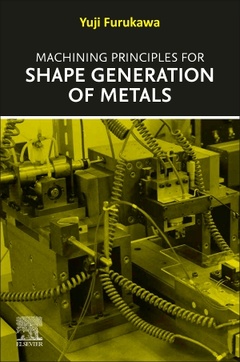Machining Principles for Shape Generation of Metals
Langue : Anglais
Auteur : Furukawa Yuji

Machining Principles for Shape Generation of Metals provides coverage of the fundamentals of machining technology and metal cutting before thoroughly explaining the Laplace transformation and how it can be applied to understand complex machining processes. The book provides an overview of all machining processes with an emphasis on machining with geometrically determinate cutting to produce superior components. Vibration control, turning, dynamics, thermal deformation, and numerical control principles of metal cutting are each discussed, as are the principles of cutting removal, forced vibration, and the physical properties of work and tool materials.
1. Virtual Principles of Geometry and Generation Principles of Physics
2. Creation Principle of Pseudo Flat Planes
3. Creation Principle of Objects with Pseudo-Constant Diameter
4. Creation Principle of Pseudo-cylinder
5. Creation Principle of a Pseudo-circular hole
6. Principle of Generating a Pseudo-Involute Profile
7. Principle of Physical Properties of Work Material
8. Principle of Physical Properties of Tool Materials
9. Motion of Processing Machines and Principle of Surface Creation
10. Cutting Removal Principle11. Uncut Part of a Set Depth of Cut
12. Principle of Forced Vibration
13. Stick-slip Phenomenon of Slideway
14. Principle of Self-Excited (Chatter) Vibration
15. Thermal Deformation Principle of Machining Systems
16. Numerical Control Principles of Metal Cutting Machines
17. Machining System Configuration Principle (Cell to FMS)
18. Science, Technology, and Engineering Related to Manufacturing
2. Creation Principle of Pseudo Flat Planes
3. Creation Principle of Objects with Pseudo-Constant Diameter
4. Creation Principle of Pseudo-cylinder
5. Creation Principle of a Pseudo-circular hole
6. Principle of Generating a Pseudo-Involute Profile
7. Principle of Physical Properties of Work Material
8. Principle of Physical Properties of Tool Materials
9. Motion of Processing Machines and Principle of Surface Creation
10. Cutting Removal Principle11. Uncut Part of a Set Depth of Cut
12. Principle of Forced Vibration
13. Stick-slip Phenomenon of Slideway
14. Principle of Self-Excited (Chatter) Vibration
15. Thermal Deformation Principle of Machining Systems
16. Numerical Control Principles of Metal Cutting Machines
17. Machining System Configuration Principle (Cell to FMS)
18. Science, Technology, and Engineering Related to Manufacturing
Yuji Furukawa is Professor Emeritus, Polytechnic University of Japan, and Professor Emeritus, Tokyo University of Agriculture and Technology. He most recently held positions of President of Myanmar Vocational Technical College, Visiting Professor of Tianjin University of Technology and Education, and Visiting Professor of Shanghai Jiao Tong University. He is currently an Emeritus Member of the Japan Society for Precision Engineering; Japan Society for Abrasive Technology; and Council of International Research Production (CIRP).
- Provides solutions to commonly encountered problems when shaping metals
- Emphasizes application of the Laplace transformation and closed loop diagram
- Covers creation principles for planes, pseudo-cylinders, and pseudo-circular holes
Date de parution : 08-2024
Ouvrage de 500 p.
15x22.8 cm
Thèmes de Machining Principles for Shape Generation of Metals :
Mots-clés :
Metal cutting; planing; Laplace transformation; closed loop diagram; deformation; slideway; surface creation; tools
© 2024 LAVOISIER S.A.S.



